Fall is just around the corner, and you know what that means, right? It means we’ll all be scrambling to stay healthy. At least, those of us with kids will be. As the cooler weather rolls in, you will find one particular cold and flu season staple on every store shelf, in every van, and in every mom’s purse: hand sanitizer.
We’re a hand sanitizer family. Now, don’t get me wrong. Our first line of defense is a healthy immune system and our second is washing washing washing those hands with soap and water. Especially before we eat. And please stop picking your nose.
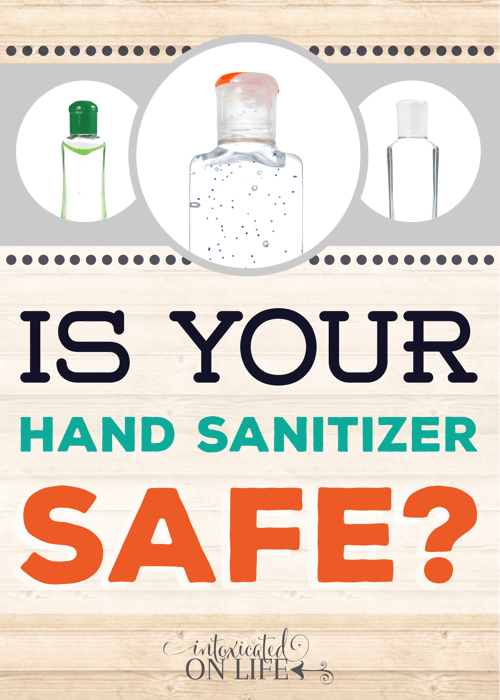
However, we’ve had bottles of hand sanitizer in our van, in our home, and in my purse for a long time. When there is no running water to be found or the toddler is seconds from sticking his sticky fingers all over the place at the park, or when we leave the grocery store (possibly the worst), out comes the sanitizing solution!
Is Your Hand Sanitizer Safe?
Of course, as we continue down the road of becoming a more healthy and health-conscious family, the question was bound to come up: is our hand sanitizer safe? What really put the issue on my radar was simply turning over the bottle and checking out the ingredients. Whether it’s a dollar store bottle or a name brand, commercial hand sanitizer ingredient labels can be a little sketchy.
Looking down that list you might find all sorts of unsavory character such as artificial colors and/or fragrances. They tend to be drying to the skin, and who knows what some of those ingredients are actually for or the negative impacts they might have on your skin!
Alcohol-Based Hand Sanitizer
You’ll also find that many hand sanitizers are alcohol-based. This may have several down-sides such as drying out the skin and just being kind of…stinky. However, there is somewhat of a contraversy about whether alcohol-based sanitizers are more desirable than alcohol-free versions. The CDC only recommends alcohol-based hand sanitizers.
There has been some concern about the safety of high-alcohol content sanitizers, especially for children. Alcohol-based hand sanitizers need to contain at least 60% alcohol in order to effectively kill germs, and according to the CDC, they will kill 99.9% of those germs! They are reliable like that. However, what happens to a child’s skin when we put a generous dollop of alcohol and chemicals on their hands? Something to think about.
Even more, what happens when the kid eats it. It might seem crazy because it tastes so bad, but kids do eat things that venture into the realm of crazy. There have also been rare cases of children needing medical attention of varying degrees of seriousness for consuming relatively small portions of hand sanitizer. Many hand sanitizer bottles have a warning printed right on them to keep them out of the reach of children. How many homes do you know that don’t follow that advice. Perhaps even yours?
Alcohol-Free Hand Sanitizer
For these reasons and more, there are several alcohol-free commercial hand sanitizers on the market. Unfortunately, many of the ingredients are not standardized, and ones that are intended to replace alcohol’s sanitizing properties come with some downers.
These ingredients include providone-iodine, benzalkonium/benzethonium chloride, or triclosan as their main defense against germs. These agents have been suggested (although this is not inconclusively proven) to make bacteria more resistant to antibiotics while likely not providing any health benefits over soap and water anyway.
How nice.
DIY Hand Sanitizer
Of course, the DIY-ers come out in full force to make their own hand sanitizers to avoid the nasties in the commercial products.
However, when you research to find that perfect recipe for you, you’ll likely still see a division on whether alcohol-based or alcohol-free is better. It seems to be pretty much down the middle. Some recipes will include using products like rubbing alcohol while others will suggest low- or no-alcohol witch hazel. Some will use only water or aloe gel as a base.
Most of them will also include essential oils with sanitizing properties, such as an immune strengthening blend, lavender, lemon, tea tree, or eucalyptus. Alcohol-free DIY hand sanitizers rely on those essential oils more to kill off germs since there is no alcohol base, but some people argue that the bacterial and virus fighting power of essential oils just doesn’t compare to alcohol and so will not be nearly as effective as a hand sanitizer.
The Bottom Line
So what’s a mom to do? Here’s my bottom line:
- Keep up a healthy front line with good food, fresh air, and exercise.
- Wash wash wash those hands with soap and water. Teach them to do it right and be a little OCD about it.
- Continue using essential oils to fight off seasonal threats.
- Keep hand sanitizer as a back up when needed.
Which hand sanitizer will I use? I will probably stick with our DIY non-toxic hand sanitizer recipe. It still kills germs, although maybe not as many as alcohol. I think I can live with that since it’s not our main way of avoiding the cold and flu. If you have a commercial product you prefer, I suggest just staying diligent to keep it away from the toddler-that-eats-everything!
Do you use hand sanitizer? If so, what kind?
Free Download: Mom’s Essential Oil Cheat Sheet
Would you like a resource to help you learn to use essential oils with your family? Download this free 3-page printable:
- Basic guidelines for using essential oils around kids
- A list of safe, kid-friendly oils essential oils
- Helpful essential oil recipes
Click the link or image below to download the 3-page Mom’s Essential Oil Cheat Sheet. I’ll follow it up with more resources and free printables to help you on your essential oil journey. Grab your copy now!

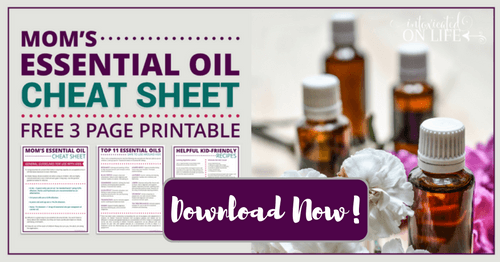
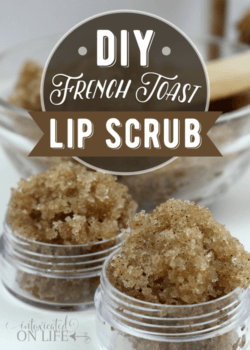
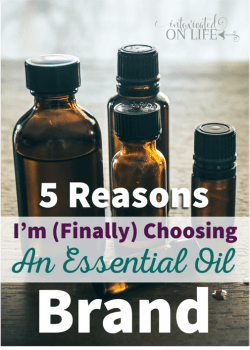
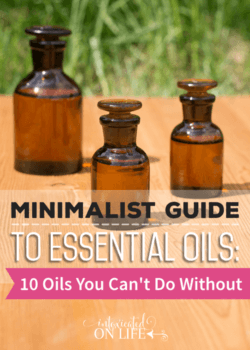
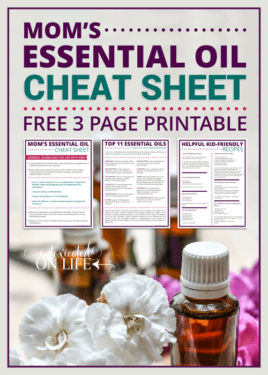





I am an NP and can totally understand the desire to be careful with germs! I live in S. Asia and some places where we live tend to be very dirty! I do think that we should be good about teaching our kids about hand washing and that it really is the Number 1 way to prevent the spread of Infection. However, in saying that I also have to say that you need to very careful about your comment about even be OCD about hand washing because too much hand washing in an OCD way can cause the skin to break down and then the first line of defense which is our skin will leave one more susceptible to germs. I only caution because I actually have a child that is very OCD about it and in some children this can become a major problem to the point of not wanting to touch anything at all. So as a medical professional I have to say to be very careful how you encourage your children to wash their hands and watch for unhealthy signs of OCD that might need counseling. We also need to remember that some germs are good for our immune systems to be in contact with because it helps our normal immune system to fight them off and it makes us more healthy. I love your website and really am encouraged by it. Thanks for sharing!
Yes, good point. That was intended as an exaggeration but your caution is well taken. Thanks!
I use zylast hand sanitizer. I do make my kids wash, wash, wash but when I can’t, I use zylast. I know at my kids’ school, they don’t have time to wash before lunch, so they use sanitizer. I hate it!!!